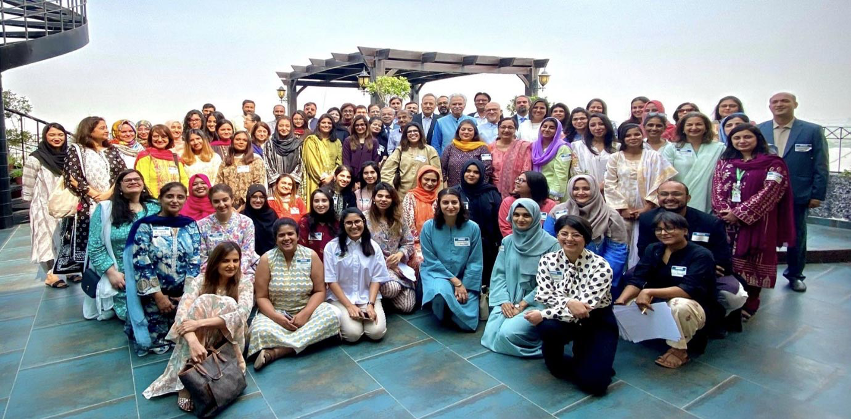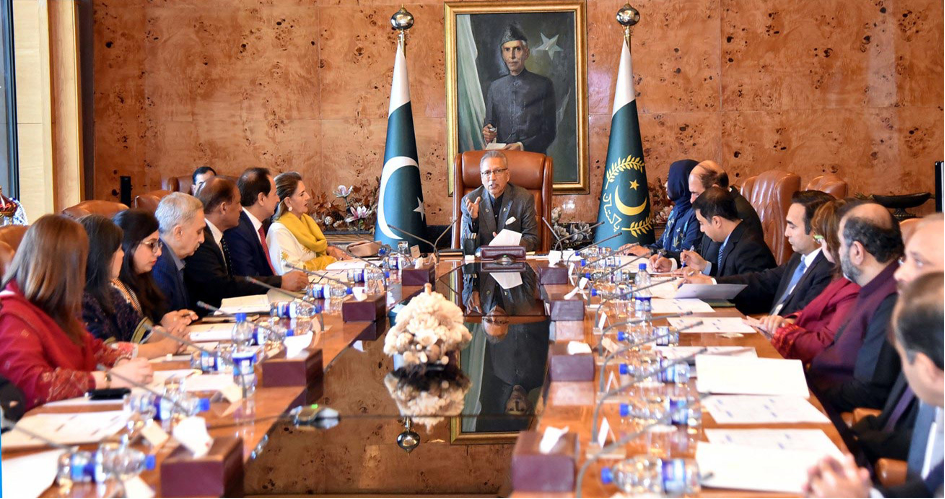Meet AIM Grant Recipient: Taskeen Health Initiative
Earlier this year, Global Health Council awarded its second round of Advocacy in Motion (AIM) Grants to five civil society organizations. These grants are intended to support advocacy, health equity, and amplify the voices of local and regional organizations. This month we are featuring one of our winners, Taskeen Health Initiative.
Based in Karachi, Taskeen Health Initiative is a nonprofit working to change people’s attitudes and behaviors towards mental health and wellbeing in Pakistan through awareness, education, expression, and advocacy. We recently spoke with Taskeen’s Senior Manager of Public Awareness and Advocacy, Duaa Nusrat, to learn more about the organization and its work.

Q: Can you tell us about your organization
Taskeen (Urdu: “to comfort”) Health Initiative’s mission is to promote mental health and prevent mental illness in Pakistan by increasing mental health awareness, providing accessible mental health services, and advocating for mental health policy change.
Taskeen has four main departments designed to achieve our objectives:
- The Public Awareness Department works to destigmatize mental illness and spread awareness about mental health through workshops, social media, and mass media.
- The Wellness Department provides free mental health support to patients through tele-mental health services, including psychotherapy, psychiatric medications, and referral to specialists.
- The Advocacy Department focuses on developing and leveraging national and international coalitions to bring about national policy change, including suicide decriminalization, development of a national mental health act, mental health regulation, and integration of mental health in universal healthcare.
- The Community Mental Health Department empowers individuals from schools, organizations, and community centers with the tools, resources, and support to manage their psychosocial well-being to build self-sustaining, self-reliant, and resilient communities
Q: This year’s grant is focused on pandemic preparedness. What were some of the challenges your community encountered during COVID-19?
The COVID-19 pandemic impacted everyone’s mental health, and people who were already experiencing mental health problems saw them worsen due to associated comorbid issues and other complications. According to the World Health Organization, mental disorders account for more than 4% of the total disease burden in Pakistan, with the mental health burden higher among women. In terms of dealing with this crisis, the lack of healthcare infrastructure, public misinformation, mental health stigma, and an inadequate government response were some of the biggest challenges faced by communities and individuals all across the nation during the COVID pandemic.
In 2020, Taskeen was one of the first organizations to recognize the need to address these challenges. We partnered to other organizations to create the COVID Mental Health Response Coalition, which built a website that directed people to free mental health services, including a lay counseling helpline, stress management workshops, and informational videos on coping with stress during COVID-19. The coalition later turned into the Pakistan Mental Health Coalition (PMHC), becoming Pakistan’s first-ever national mental health coalition.

Q: What do you think is missing from global pandemic preparedness planning efforts? What would you like to see changed, at the global, national, and local level?
Global pandemic preparedness often overlooks one of the most essential healthcare aspects—that of mental health and psychosocial wellbeing. This, coupled with inadequate coordination and uneven distribution of resources in LMICs, has a huge impact on overall planning in times of crisis. In order to address these challenges on a global level, it is important to increase international coordination and information-sharing to help countries inform their planning strategies. On a national and local level, it is essential to prioritize the inclusion of mental health in the existing healthcare infrastructure. Moreover, it is crucial to focus on research and development of national protocols, which serve as a blueprint for national crises and emergencies.
Q: What is the biggest challenge your organization is facing today?
In terms of PPPR (Pandemic Prevention, Preparedness, and Response), one of the biggest challenges our organization is facing is a lack of integrated mental health response in the national disaster response protocols. In a country like Pakistan, where mental health is both stigmatized and inaccessible, it is crucial to integrate psychosocial support within the existing health structures. And this must be done while promoting awareness about the impact of poor mental health on the wellbeing of individuals and communities. This challenge has arisen due to unwillingness from the federal and provincial governments to acknowledge the need for psychosocial support in pandemic preparedness response. Political instability further adds to this conundrum, with Pakistan currently being governed by an interim or caretaker government in the absence of democratically elected officials. The temporary authority of the interim government places mental health support as a low priority, making it challenging to sustain long-term projects aimed at integrating psychosocial support into PPPR without government commitment.

Q: What are you currently doing to overcome these challenges? What help do you need to overcome them?
As one of the founding members of the Pakistan Mental Health Coalition (PMHC), Taskeen has initiated an Emergency and Crisis Response (ECR) working group which aims to mobilize mental health action in cases of health emergencies. The ECR consists of key stakeholders in the private sector of mental healthcare in Pakistan, who will actively engage stakeholders from the public sector—such as policymakers, bureaucrats, and government health officials—to garner support for integrating mental health in national health emergency response. In addition to researching literature to integrate mental health support in PPPR, the ECR working group will develop a protocol based on best practices in the Global South for psychosocial support in PPPR.
At present, Taskeen requires support for its advocacy activities, which is crucial to successfully implement its current plan.
Q: How are you hoping the AIM Grant will help your organization?
Using the AIM grant, we hope to establish mental health support as an integral component of national PPPR interventions and to fill the research gaps pertaining to mental health and national health emergencies. This will be done through collective advocacy efforts to mobilize key stakeholders, such as private and public mental health services, national and provincial health ministries, and civil society organizations.
Q: What is the most important message you want to give to global health decision-makers about pandemic preparedness?
The most important message for global health decision-makers is to cooperate with global pandemic action whilst advocating for increased financing and equal access to resources. Moreover, mental health considerations must be an integral part of the preparedness planning processes in order to safeguard the health of populations worldwide. Lastly, it is crucial to utilize learnings from past pandemics (e.g., the COVID-19 pandemic) to better inform the restructuring of health systems and development of global and national response plans.